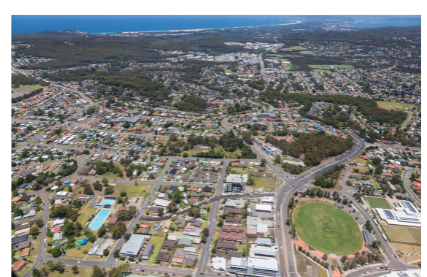Refinancing Home Loan in NSW: Top 10 Reasons to Make the Switch
Refinancing a home loan in New South Wales is a big deal for homeowners in 2025 – and for good reason! It’s all about replacing your current mortgage with one that better fits your needs.
With lower interest rates and flexible loan options, many are jumping at the chance to reduce monthly repayments, consolidate debts, or tap into their home equity.
Mortgage brokers play a key role during mortgage refinancing. They help simplify the process and compare loans and lenders to help clients find the best options for their financial goals.
Ready to explore your refinancing options in NSW? Let's dive into the compelling reasons why now might be the perfect time to make the switch.
🏡 Need Home Loan help?
We've helped thousands of locals.
Just call us on (02) 4920 6468
Or visit our website homepage
Why Refinancing Your Home Loan in NSW is a Game-Changer in 2025
Refinancing a home loan means replacing your current mortgage with a new loan that offers better terms, a different structure, or more attractive features. Whether you're looking to lock in lower rates or consolidate debt, refinancing provides plenty of opportunities to improve your financial situation.
In 2025, market trends in NSW make refinancing particularly appealing. Property prices in Newcastle and surrounding areas have stabilised following the consecutive rate rises of 2023-24 (CoreLogic), while the Reserve Bank of Australia’s (RBA) official cash rate is expected to remain steady.
This stable environment has led to competitive interest rates and more flexible loan products from lenders, giving homeowners the chance to secure deals tailored to their financial goals.
10 Reasons Why You Should Consider Refinancing Your Home Loan
Curious about how refinancing can work for you? Let’s dive into the top 10 reasons homeowners are jumping on this opportunity in 2025.
Reason #1: Take Advantage of Lower Interest Rates in 2025
Interest rates in 2025 are expected to hover at historically low levels. NSW homeowners, especially in cities like Newcastle, can benefit from refinancing to lock in these rates.
How Low Rates Save You Money:
For a $600,000 loan, switching from a 6.5% rate to a 5.5% rate could save you over $300 per month in mortgage repayments. That’s an extra $3,600 a year!
Historical Comparison:
In 2023, standard home loan rates were around 6.8%. By 2025, many lenders are anticipated to be offering rates closer to 5%, depending on your credit score and loan type.
Reason #2: Reduce Your Monthly Mortgage Payments
Refinancing can significantly lower your monthly repayments by either securing a lower rate or extending your loan term.
Real Savings Example:
Let’s say your current mortgage has 20 years remaining with $500,000 owing. By refinancing and extending the term to 25 years, your monthly payments could drop by hundreds. However, be cautious – extending your loan term increases the total interest paid.
Pro Tip:
Use a mortgage switching calculator to see the true cost and benefits of refinancing.
Reason #3: Consolidate Your Debts
If you’re juggling credit card debt, personal loans, or other liabilities, refinancing lets you combine everything into one manageable monthly payment.
Benefits of Debt Consolidation:
- Lower overall interest rates compared to credit cards.
- Simplified repayments with one lender.
- Improved cash flow.
Example:
A Newcastle homeowner with $30,000 in credit card debt at 18% interest refinanced into their mortgage at 5.5%, saving thousands in annual interest.
Reason #4: Switch to a Fixed or Variable Rate Loan
Your current loan might not align with your financial circumstances anymore. Refinancing allows you to switch between fixed-rate home loans and variable-rate loans.
What’s Better for You?
- Fixed-Rate Loans: Ideal if you want predictable payments.
- Variable-Rate Loans: Suitable if you expect rate drops or want flexibility for extra repayments.
In 2025, many NSW homeowners are expected to choose split loans, combining the best of both worlds of fixed and variable rate loans.
Reason #5: Unlock Your Home’s Equity
Refinancing can unlock your property’s equity, giving you access to extra cash for renovations, an investment property, or even an extra bedroom for your growing family.
Example of Equity Use:
A Newcastle homeowner refinanced their $700,000 home with a $400,000 outstanding loan balance. By accessing $150,000 in equity, they renovated their property and boosted its value by $200,000.
Reason #6: Shorten Your Loan Term
By refinancing, you can switch to a shorter loan term. While your monthly repayments might increase slightly, the long-term savings in interest can be substantial.
Case Study:
A Newcastle couple, looking to reduce the long-term cost of their current home loan, decided to refinance their 30-year mortgage into a 20-year term. By securing a lower interest rate and shortening the rate term, they were able to save over $100,000 in interest payments.
Although their monthly loan repayments increased slightly, the couple saw this as an investment in their financial future. With their new loan, they’re now on track to own their home outright 10 years earlier, giving them greater peace of mind and flexibility for retirement planning.
Reason #7: Remove Lender’s Mortgage Insurance (LMI)
If you’re currently paying lenders mortgage insurance (LMI), refinancing could help you eliminate this expense, provided your equity has grown beyond 20%.
Tips:
- Get a property valuation to confirm your equity.
- Check your current loan contract for LMI conditions.
- Compare offers from other lenders to ensure you're getting the lowest interest rate.
- Speak with a mortgage broker to explore flexible home loan options that avoid LMI altogether.
Reason #8: Improve Loan Features and Flexibility
Modern home loans come with features like offset accounts, redraw facilities, and flexible repayment options. Refinancing can upgrade you to a loan that better suits your lifestyle.
Additional Features to Look For:
- Extra repayments without penalties.
- Flexible loan terms that adapt to your needs.
- Offset sub-accounts to reduce interest.
Reason #9: Adjust to Major Life Changes
Life changes - and your mortgage should keep up! Major events like marriage, having kids, retirement, or divorce can shift your financial priorities, leaving your current loan no longer suited to your needs.
If you’ve started a family and need more space, refinancing can unlock your home’s equity for renovations or even a move to a bigger property. Approaching retirement? Refinancing could help lower monthly repayments or shorten your loan term.
In cases like divorce, it can help one party take over the loan or consolidate joint debts. Whatever the change, refinancing gives you the flexibility to realign your loan with your new reality.
Pro Tip:
Before refinancing during a life change, review your financial circumstances carefully and consider speaking to a mortgage broker. They can guide you through the process and ensure the new loan fits both your short- and long-term goals.
Reason #10: Escape a Bad Lender or High Fees
If you’re stuck with a lender that charges excessive fees or offers poor service, refinancing can help you make the switch. Look for competitive interest rates and transparent loan agreements.
Hidden Fees to Avoid:
- Discharge fees.
- Mortgage registration fees.
- Valuation fees.
Pro Tip:
Before refinancing, carefully calculate the true cost of switching. Use a mortgage switching calculator and compare offers from multiple lenders. A mortgage broker can help you find a lender with lower fees and better terms, ensuring your new loan meets your financial goals.
Ready to transform your mortgage payments? Read our
comprehensive refinancing guide - designed to help Newcastle and NSW homeowners make smarter lending choices.
Costs of Refinancing: What to Expect in 2025
While refinancing can save you money in the long run, it’s important to understand the upfront costs involved. Knowing these expenses will help you determine whether refinancing is the right financial move for you.
Overview of Potential Costs:
- Application Fees: Usually $250–$600, charged by lenders to process your new loan.
- Exit Fees: If you’re breaking a fixed-rate loan, you may face significant break costs, depending on your remaining loan term and interest rates.
- Mortgage Registration Fees: These state government charges, typically $150–$300, cover the transfer of your loan to a new lender.
- Valuation Fees: Often $200–$400, these fees ensure the property’s value aligns with the loan amount.
- Discharge Fees: Your current lender may charge up to $350 to close your existing mortgage.
How to Calculate the Break-Even Point:
The break-even point is when your refinancing savings exceed the total costs of switching. Divide the refinancing costs by the monthly savings from your new loan. For example, if refinancing costs $3,000 and you save $250 per month, you’ll break even in 12 months.
Understanding these costs helps you make an informed decision about whether refinancing will truly benefit your financial circumstances in 2025.
🏡 Need Home Loan help?
We've helped thousands of locals.
Just call us on (02) 4920 6468
Or visit our website homepage
Frequently Asked Questions
When is the best time to refinance in NSW?
The best time to refinance is when current interest rates are lower than what you're paying on your current home loan. Additionally, it’s a good time if your financial situation has improved, such as a better credit rating or increased borrowing power. These changes can help you qualify for competitive home loans with your current lender or a new one.
How does refinancing affect your credit score?
Refinancing can cause a temporary dip in your credit rating because lenders will perform a credit report check as part of the loan application. However, as long as you keep up with your loan repayments, the impact on your score is typically short-lived.
Are there risks involved in refinancing?
Yes, refinancing has risks. You may face termination fees or a break fee if you’re leaving a fixed rate term. Additionally, refinancing into a longer loan term can increase the overall interest you pay. Make sure to review all refinancing costs carefully before making a decision.
What documents do I need for refinancing?
You’ll need standard loan documents such as proof of income (like payslips), bank statements, and your existing loan contract from your current lender. These help the loan lender assess your eligibility for a new flexible home loan or construction loan.
Can I refinance an investment property?
Yes, you can refinance an investment property, but be aware that lending criteria may be stricter. Lenders might require a higher Comparison Rate or additional documentation to assess rental income and loan interest rates.
What’s the average cost of refinancing?
The refinancing costs usually range between $1,000 and $3,000. This includes termination fees from your current lender, property valuation fees, lenders mortgage insurance (if applicable), and other costs like stamp duty.
How long does the refinancing process take?
The process generally takes 4–6 weeks, depending on how quickly you can provide all required loan documents and how efficiently your new financial institution processes your loan application.
Final Thoughts: Is Refinancing Right for You in 2025?
Refinancing offers countless financial advantages, from lower monthly payments to accessing equity. But it’s not a one-size-fits-all solution. Evaluate your financial goals, consult a mortgage broker, and crunch the numbers to make an informed decision.
Need help? Call the experts at
Mortgage Brokers Newcastle on
02 4920 6468 for personalised advice.

Researching home loans?
Or just call us on 📞 (02) 4920 6468
All Rights Reserved. SEO by Copyburst



